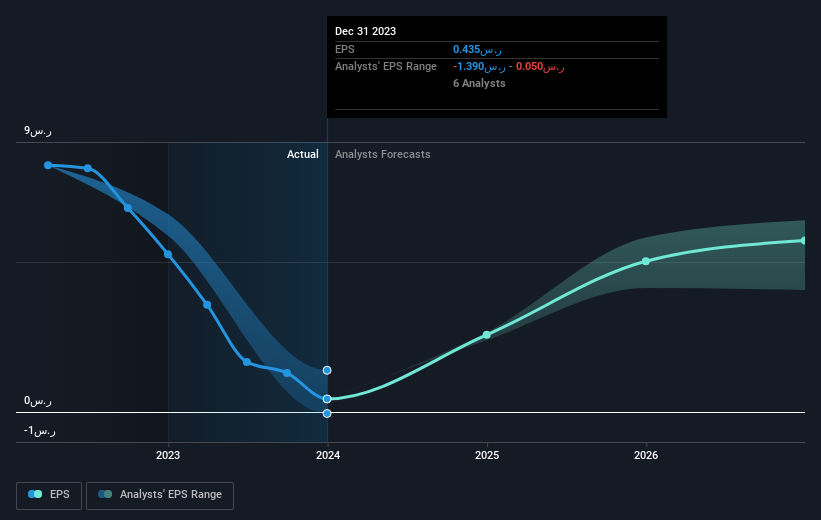Stock Analysis
- Saudi Arabia
- /
- Chemicals
- /
- SASE:2010
Investors who have held Saudi Basic Industries (TADAWUL:2010) over the last five years have watched its earnings decline along with their investment

Saudi Basic Industries Corporation (TADAWUL:2010) shareholders should be happy to see the share price up 13% in the last month. But if you look at the last five years the returns have not been good. In fact, the share price is down 29%, which falls well short of the return you could get by buying an index fund.
The recent uptick of 6.5% could be a positive sign of things to come, so let's take a look at historical fundamentals.
See our latest analysis for Saudi Basic Industries
While markets are a powerful pricing mechanism, share prices reflect investor sentiment, not just underlying business performance. One imperfect but simple way to consider how the market perception of a company has shifted is to compare the change in the earnings per share (EPS) with the share price movement.
Looking back five years, both Saudi Basic Industries' share price and EPS declined; the latter at a rate of 43% per year. This fall in the EPS is worse than the 7% compound annual share price fall. So the market may previously have expected a drop, or else it expects the situation will improve. With a P/E ratio of 203.27, it's fair to say the market sees a brighter future for the business.
You can see how EPS has changed over time in the image below (click on the chart to see the exact values).

It's probably worth noting that the CEO is paid less than the median at similar sized companies. It's always worth keeping an eye on CEO pay, but a more important question is whether the company will grow earnings throughout the years. Before buying or selling a stock, we always recommend a close examination of historic growth trends, available here..
What About Dividends?
It is important to consider the total shareholder return, as well as the share price return, for any given stock. The TSR incorporates the value of any spin-offs or discounted capital raisings, along with any dividends, based on the assumption that the dividends are reinvested. So for companies that pay a generous dividend, the TSR is often a lot higher than the share price return. We note that for Saudi Basic Industries the TSR over the last 5 years was -13%, which is better than the share price return mentioned above. This is largely a result of its dividend payments!
A Different Perspective
Saudi Basic Industries provided a TSR of 1.1% over the last twelve months. Unfortunately this falls short of the market return. On the bright side, that's still a gain, and it is certainly better than the yearly loss of about 3% endured over half a decade. It could well be that the business is stabilizing. It's always interesting to track share price performance over the longer term. But to understand Saudi Basic Industries better, we need to consider many other factors. To that end, you should be aware of the 3 warning signs we've spotted with Saudi Basic Industries .
But note: Saudi Basic Industries may not be the best stock to buy. So take a peek at this free list of interesting companies with past earnings growth (and further growth forecast).
Please note, the market returns quoted in this article reflect the market weighted average returns of stocks that currently trade on Saudi exchanges.
Valuation is complex, but we're helping make it simple.
Find out whether Saudi Basic Industries is potentially over or undervalued by checking out our comprehensive analysis, which includes fair value estimates, risks and warnings, dividends, insider transactions and financial health.
View the Free AnalysisHave feedback on this article? Concerned about the content? Get in touch with us directly. Alternatively, email editorial-team (at) simplywallst.com.
This article by Simply Wall St is general in nature. We provide commentary based on historical data and analyst forecasts only using an unbiased methodology and our articles are not intended to be financial advice. It does not constitute a recommendation to buy or sell any stock, and does not take account of your objectives, or your financial situation. We aim to bring you long-term focused analysis driven by fundamental data. Note that our analysis may not factor in the latest price-sensitive company announcements or qualitative material. Simply Wall St has no position in any stocks mentioned.
About SASE:2010
Saudi Basic Industries
Saudi Basic Industries Corporation engages in the manufacture, marketing, and distribution of chemicals, polymers, plastics, agri-nutrients, and metal products worldwide.
Flawless balance sheet and good value.

